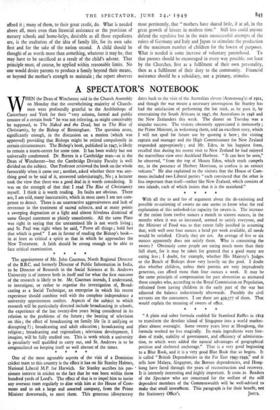A SPECTATOR 'S NOTEBOOK
HEN the Dean of Winchester said in the Church Assembly on Monday that the overwhelming majority of Church-
men were profoundly grateful to the Archbishops of Canterbury and York for their " very solemn, formal and public censure of a certain book " he was not referring, as might conceivably be supposed, to The Naked and the Dead, but to The Rise of Christianity, by the Bishop of Birmingham. The question arose, significantly enough, in the discussion on a motion (which was approved) providing that Bishops might be retired compulsorily in certain circumstances. The Bishop's book, published in 1947, is likely to remain a storm-centre for some time. It 'has been widely but not universally condemned. Dr. Barnes is a Cambridge man—as is the Dean of Winchester—but the Cambridge Divinity Faculty is well divided on the subject. One Professor reviewed the book on the whole favourably when it came out ; another, asked whether there was any- thing good to be said of it, answered unhesitatingly, No ; a lecturer took the view that there was a good deal in it worth considering. It was on the strength of that that I read The Rise of .Christianity myself. I think it is worth reading. Its faults are obvious. There are, I am told, many inaccuracies, which in most cases I am not com- petent to detect. There is an unattractive aggressiveness and lack of reverence in the treatment of sacred subjects, and at many points a sweeping dogmatism or a light and almost frivolous dismissal of some Gospel statement as plainly unauthentic. All the same Plato was right in saying that the unexamined life is not worth living ; and St. Paul was right when he said, "Prove all things-; hold fast that which is good." I am in favour of reading the Bishop's book— in at least as critical a spirit as that in which he approaches the New Testament. A faith should be strong enough to be able to face critical examination.
* * * *


































 Previous page
Previous page